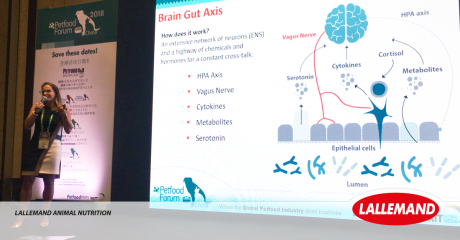Probiotics For Anxiety In Dogs
Anxiety in dogs is caused by a variety of intrinsic or external factors, or a combination of both. Whatever may be the cause of a dog’s anxiety, the severity of the problem continues to be an important concern. The senses of anxious dogs are constantly heightened in anticipating negative situations even when there’s no clear indication that something bad or frightening is about to happen. Anxiety causes a dog to live in a state of chronic stress.
Stress and Anxiety Can Have a Negative Effect on Dogs
Stress and anxiety can pave the way for a variety of health and behavioral problems that can adversely affect the health and well-being of pets. In addition to digestive upsets, such as an upset stomach and diarrhea, stress and anxiety can cause dogs to display undesirable changes in behavior.
Anxiety is also a potent fuel for aggressive displays of behavior. Aggression in dogs is caused by a variety of issues, many of which are poorly resolved. Unfortunately, aggressive behavior is one of the top reasons dogs are turned over to shelters or abandoned by their owners.
Anxious behaviors in dogs, such as barking, pacing, jumping, destructive behavior, and heightened reactivity to strangers, are often treated with behavior modification techniques, medication, and sometimes with the use of pheromones.
Probiotic Supplementation and Anxiety in Dogs
Recent scientific breakthroughs in addressing stress and anxiety in dogs is probiotic supplementation.
Recent research studies have been able to show an association between the gut microbiome (the genetic material of all the microbes - bacteria, fungi,yeast, protozoa and viruses - that live on and inside the dog's body)and behavior in mammals, particularly mice and humans. There is also mounting evidence that manipulation of the microbial population in the gut could have a positive influence on anxious behavior in dogs. There are four primary avenues by which manipulation of the gastro intestinal tract microbiome can be achieved:
- use of antibiotics
- transplants of fecal matter
- probiotics
- prebiotics.
A study conducted on 24 Labrador retrievers with anxiety problems showed that the probiotic Bifidobacterium longum BL999 appeared to have an anxiolytic (anxiety reducing) drug effect on anxious dogs.
How Do Probiotics Affect Brain Function?
Have you ever experienced an upset stomach when you were in a stressful situation? This is because of the interrelationship of your digestive system and your nervous system, which is referred to as the ‘gut-brain axis’. This is also present in dogs. When dogs find themselves in situations that cause them to become anxious, they can suffer from digestive upsets, and may have diarrhea.
Gut-Brain Axis
The gut-brain axis refers to the physiological relationship that exists between the microbiome in the gut and the central nervous system. This connection means that the gut microbial population can have an effect on the function of the nervous system and can therefore influence behavioral issues.
Stress Can Upset the Balance of Gut Microbiome
When dogs are exposed to stress, the ratio between good and bad bacteria in the gut is affected. The number of beneficial bacteria is reduced, allowing the proliferation of bad bacteria.
Although stress-related digestive upsets are not a serious health risk, it is a major concern to many pet parents, ethical breeders and kennel owners. Digestive disturbances in dogs are usually treated with dietary modification, antimicrobial agents, and/or electrolytes rehydration. The overuse of antibiotics and the potential adverse effects associated with their use have led to increased interest in alternative ways of treating the issue, such as the use of select probiotics and prebiotics.
What are Probiotics?
“Probiotics are live microorganisms that, when ingested in sufficient effective amounts, exert beneficial health effects to the dog by modulating the intestinal microbial environment in favor of non-pathogenic bacterial species” (Flock, et al 2008).
Ideal Properties of a Probiotic for Pets
- Non-pathogenic
- Contain the appropriate beneficial bacterial strains for pets
- Are not common human probiotics
- Stable during shelf-life
- Resistant to temperature shock
- Resistant to gastric and intestinal digestion by acid, enzymes, and bile
- Able adhere to the epithelium lining of the intestine
- Able to interact positively with gastrointestinal flora
- Easy to administer
- Capable of positively influencing immune responses of the dog
Mechanisms of Actions of Probiotics
- Reduce the pH (acidity) of the intestine to allow beneficial bacteria that thrive in acidic environments to survive
- Destroy bad bacteria and toxins
- Bind with the bad pathogenic bacteria to minimize their effects
- Compete with bad bacteria for essential nutrients or receptor sites
- Produce antimicrobial substances that inhibit pathogenic microbial activity
Scientific Studies on Probiotics and Dog Anxiety and Other Behavioral Issues
The interest of the scientific community on the effect of probiotics on anxiety in dogs continues to mount as more and more evidence shows the influence of the gut microbiome on affective disorders of the nervous system, such as anxiety, aggression and depression. Here are some studies that demonstrate the positive effects of probiotics on dog anxiety.
- Dietary supplementation with a strain of B longumreduced cortisol concentrations, heart rate, and several anxious behaviors in dogs. (McGowan, RTS., 2016)
- Gut bacteria can produce neuroactive substances, such as precursors There is an inverse relationship between the serotonin metabolite, 5-hydroxyindoleacetic acid (5-HIAA), and aggressive behaviors (Coccaro et al., 2015)
- Significant positive effects of probiotic supplementation were observed in healthy adult dogs that were exposed to the stress of relocation from a home environment to a kennel environment (Kelley, et al., 2012)
The use of probiotics as a nutritional solution to dog anxiety continues to be explored. But the results of scientific studies that have already been conducted show that specific bacterial strains, such as Bifidobacterium longum, have a positive effect in addressing anxiety and stress issues in dogs. Suffice to say, good quality probiotics for dogs should be considered as part of a management plan to alleviate anxiety in dogs as well as improve their health and well-being.

